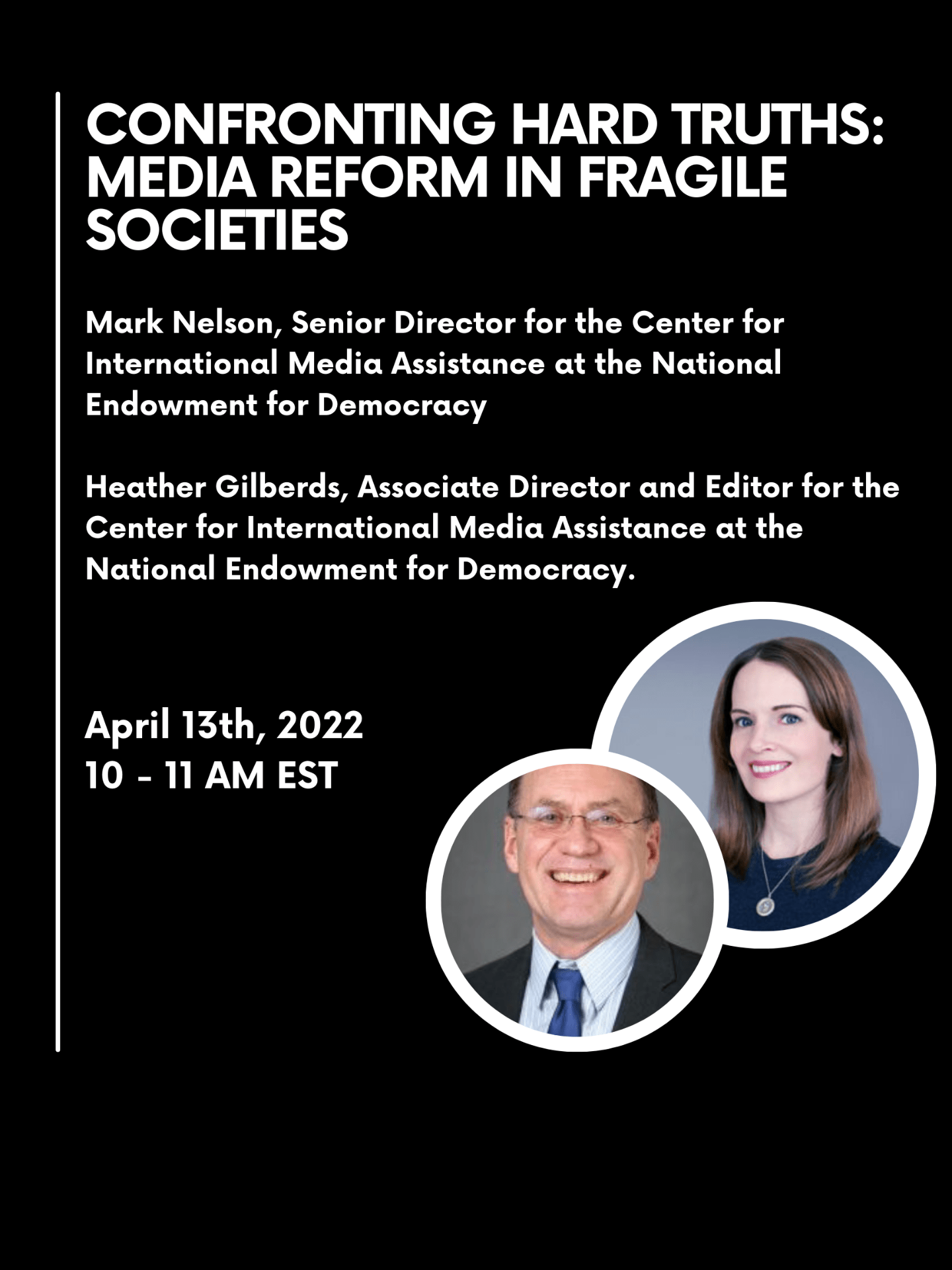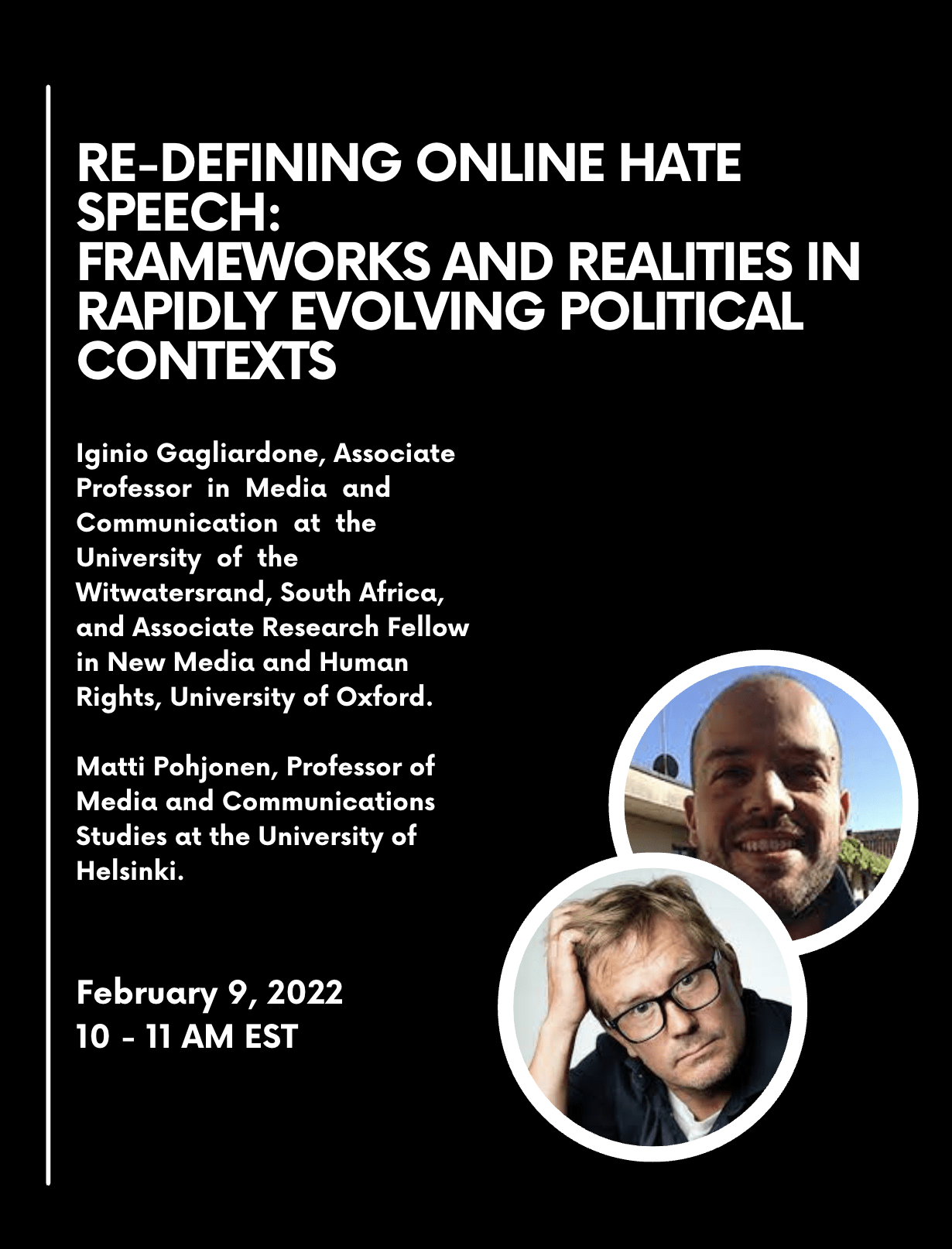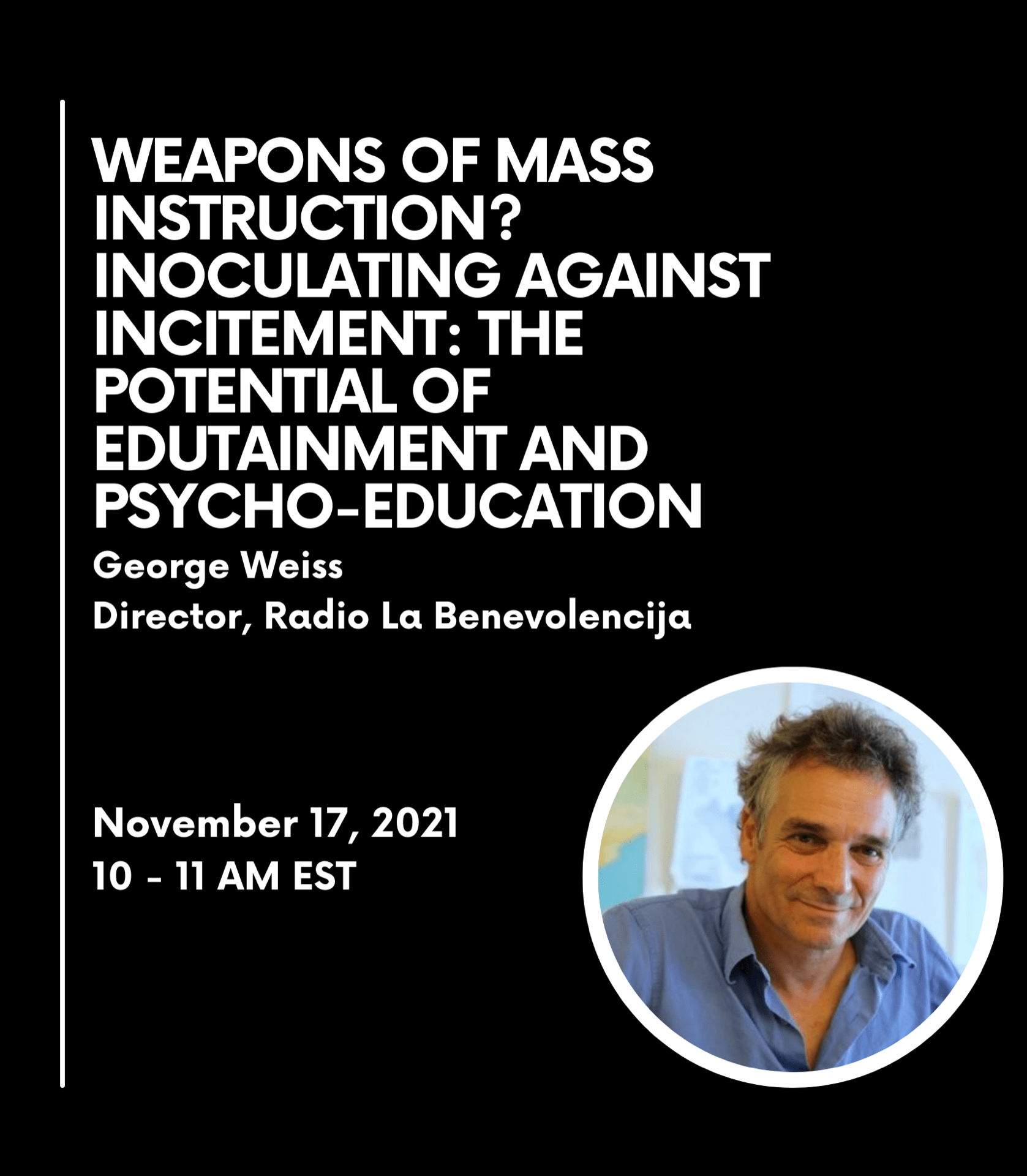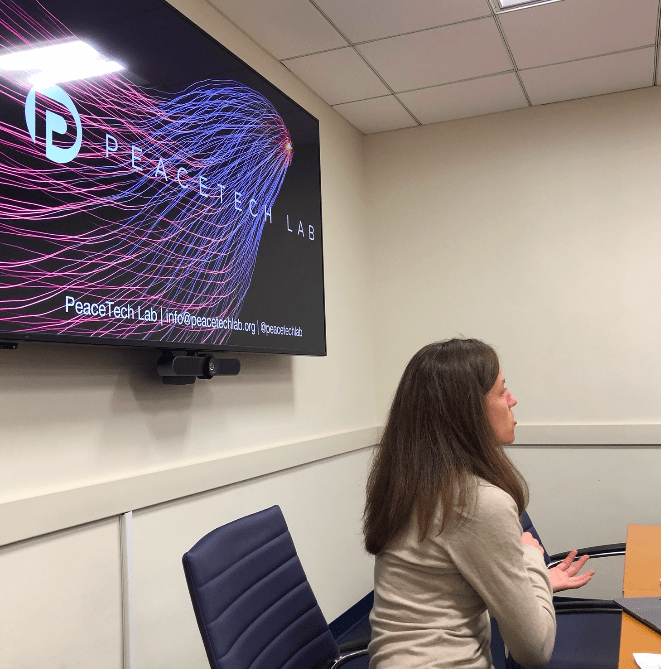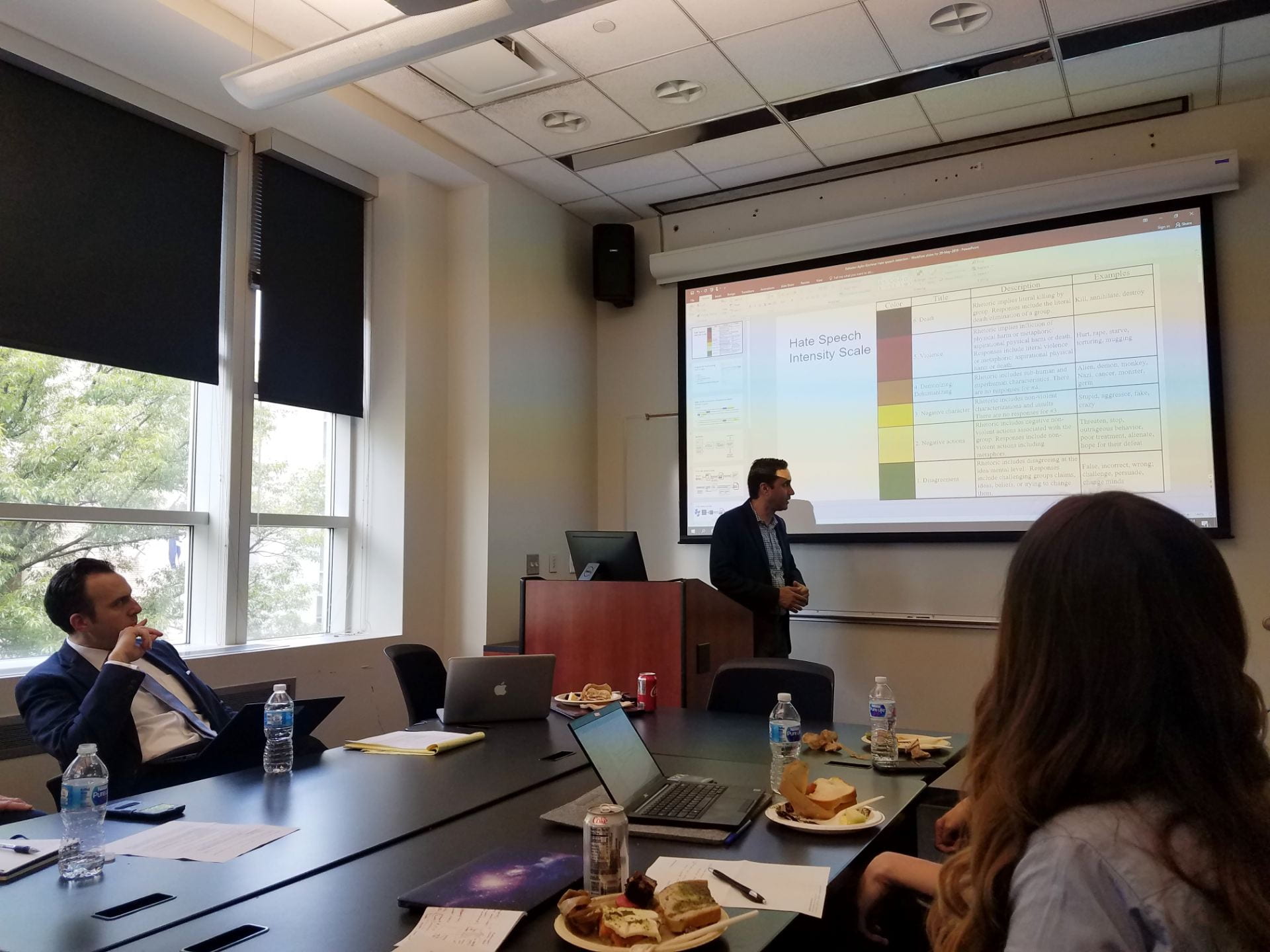Upcoming Events
There are currently no upcoming events.
Past Events
Webinar Series: How to Grow Peace Journalism?
Week 6: Lessons in Journalism and Social Media
This webinar is the finale of a 6-part webinar series. Three researchers will present their key insights on innovations in journalism to answer these important questions. Each researcher will present for 10 minutes, followed by about 20 minutes of Q&A and discussion.
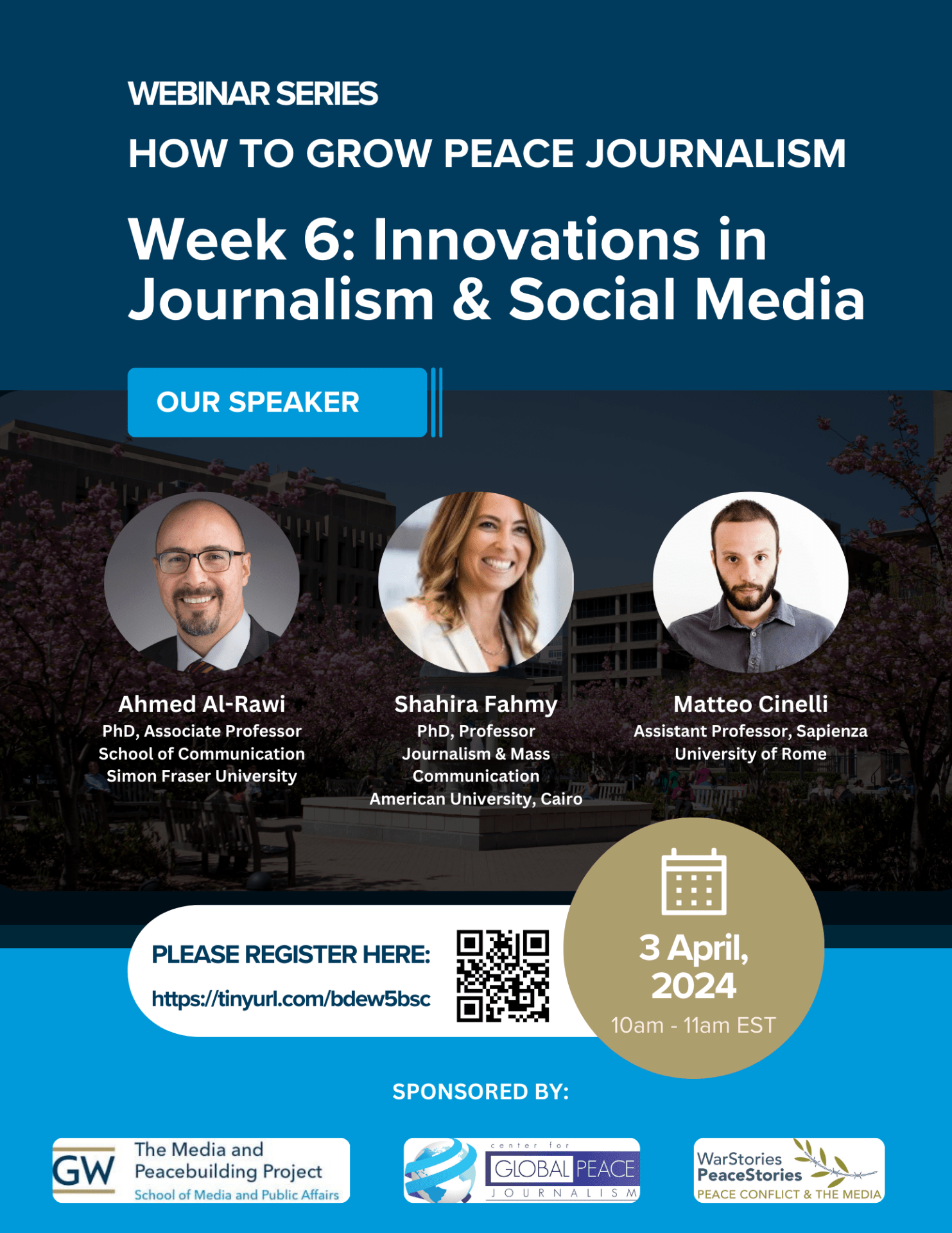
04/03/2024
Panelists
Ahmed Al-Rawi is an Associate Professor of News, Social Media, and Public Communication at the School of Communication at Simon Fraser University. Read More
Shahira Fahmy is a professor in the Department of Journalism and Mass Communication at the American University in Cairo. Read More
Dr. Matteo Cinelli is an Assistant Professor in Computer Science at the University of Rome “La Sapienza”, Rome, Italy. Read More
Webinar Series: How to Grow Peace Journalism?
Week 5: Lessons from the Global South
This webinar is the fifth of a 6-part webinar series. Four researchers will present their key insights from peace journalism in the Global South on these important questions. Each researcher will present for 10 minutes, followed by about 20 minutes of Q&A and discussion.
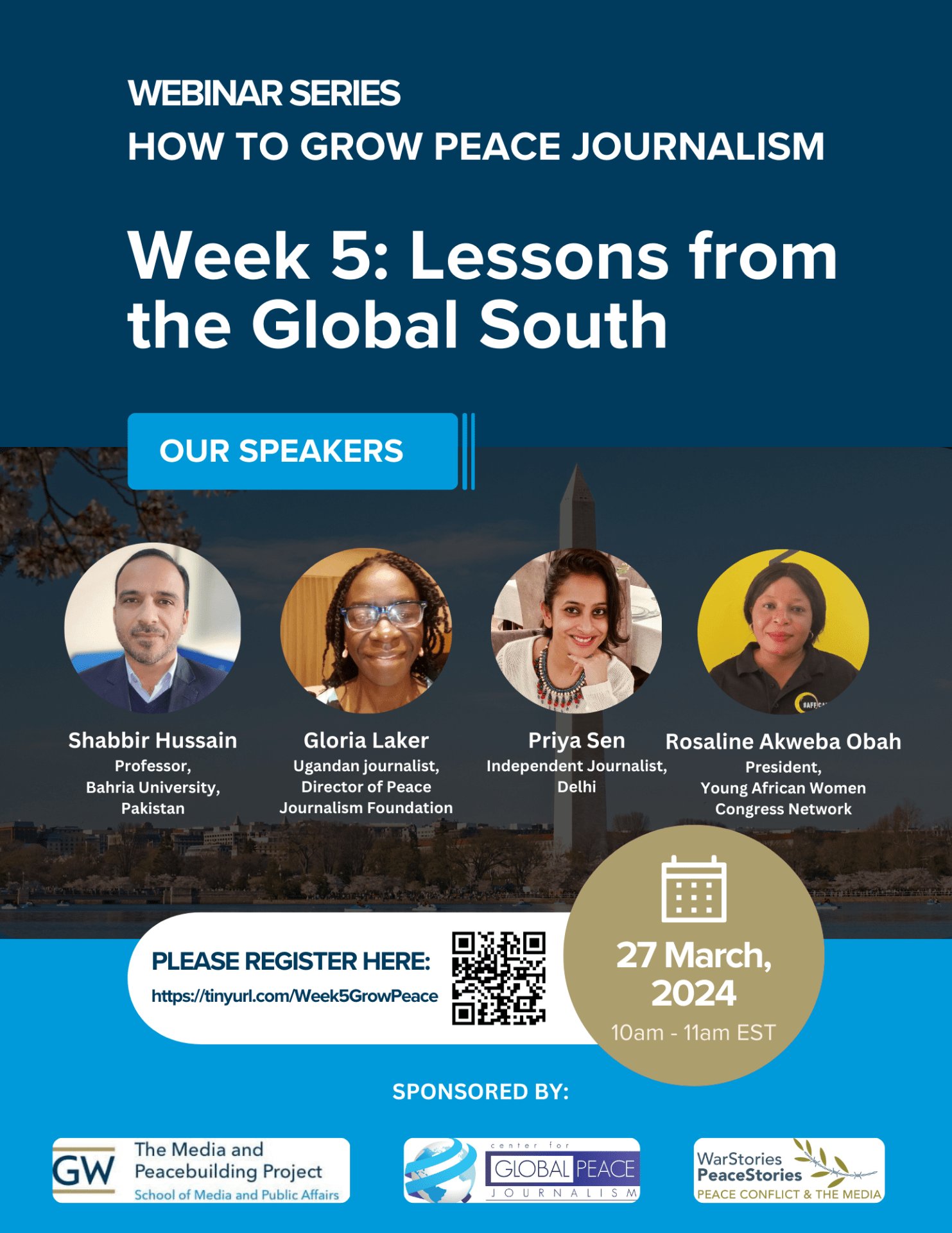
03/27/2024
Panelists
Shabir Hussain is a peace academic based in Islamabad, Pakistan. Read More
Gloria Laker Aciro is a Ugandan awards-winning journalist, a media trainer, and the Director of the Peace Journalism Foundation (PJF). Read More
Rosaline Akweba Obah is a Trainer/Consultant in Peace Journalism & Conflict Transformation. Read More
Priyadarshini Sen is an independent journalist based in Delhi. Read More
Webinar Series: How to Grow Peace Journalism?
Week 4: Lessons from Solutions Journalism
This webinar is the fourth of a 6-part webinar series. Three researchers will present their key insights from solutions journalism on these important questions. Each researcher will present for 10 minutes, followed by about 20 minutes of Q&A and discussion.
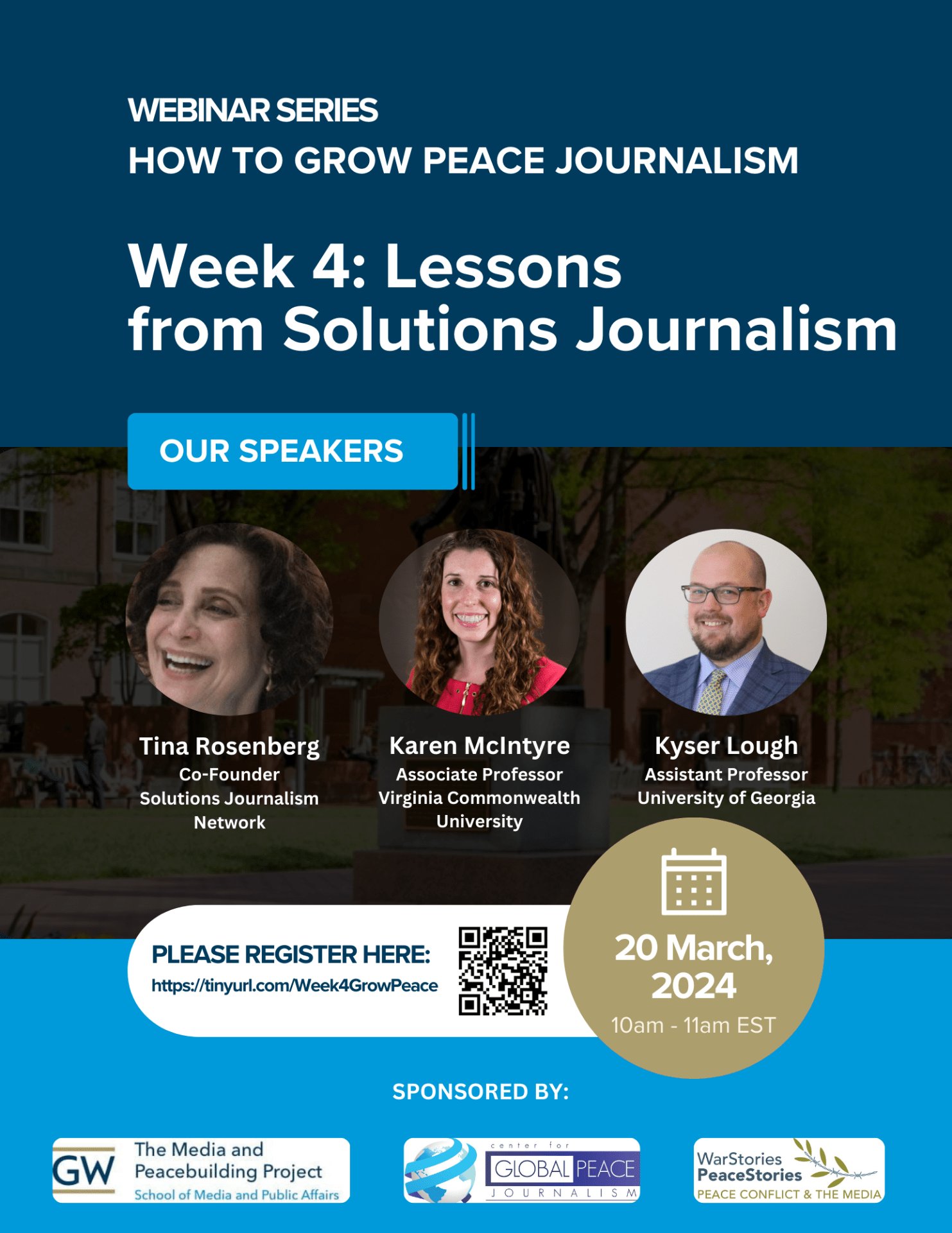
03/20/2024
Panelists
Tina Rosenberg is co-founder of the Solutions Journalism Network. Read More.
Karen McIntyre, Ph.D., is an associate professor of multimedia journalism and the director of graduate studies at the Richard T. Robertson School of Media and Culture at Virginia Commonwealth University. Read More.
Kyser Lough is an Assistant Professor of Journalism at the University of Georgia (USA), where he teaches and researches visual communication and solutions journalism. Read More.
Webinar Series: How to Grow Peace Journalism?
Week 3: Lessons from Constructive Journalism
This webinar is the third of a 6-part webinar series. Three panelists will present about their research in constructive journalism during this moderated discussion. Each researcher will present for 10 minutes, followed by about 20 minutes of Q&A and discussion.

03/13/2024
Panelists
Tanja Aitamurto, PhD, is an Assistant Professor in the Department of Communication at the University of Illinois Chicago, where she leads the Media/Democracy Lab. Read more.
Bette Dam is an investigative journalist with a focus on Afghanistan, having authored two books that challenge Western narratives surrounding the country. Read more.
Catherine Gyldensted (1973) is an investigative journalist and author. Read more.
Webinar Series: How to Grow Peace Journalism?
Week 2: Findings from Peace Journalism Practice
This webinar is the second of a 6-part webinar series. Four practitioners will present their key insights from peace journalism. Each researcher will present for 10 minutes, followed by about 20 minutes of Q&A and discussion.
03/6/2024
Panelists
Vanessa Bassil is the Founder, President & Executive Director of the Media Association for Peace (MAP). Read More
Andrea Muraskin is a freelance audio producer and writer with over a decade of experience in public radio and podcasting. Read more
Jamil Simon is an award-winning documentary filmmaker, communications expert and a lifelong peace activist. Read More
Steven Youngblood is the founding director of the Center for Global Peace Journalism at Park University, where he is a communications and peace studies professor. Read More
Webinar Series: How to Grow Peace Journalism?
Week 1: Lessons from Peace Journalism Research
This webinar is the first of a 6-part webinar series. Each researcher will present for 10 minutes, followed by about 30 minutes of Q&A and discussion.
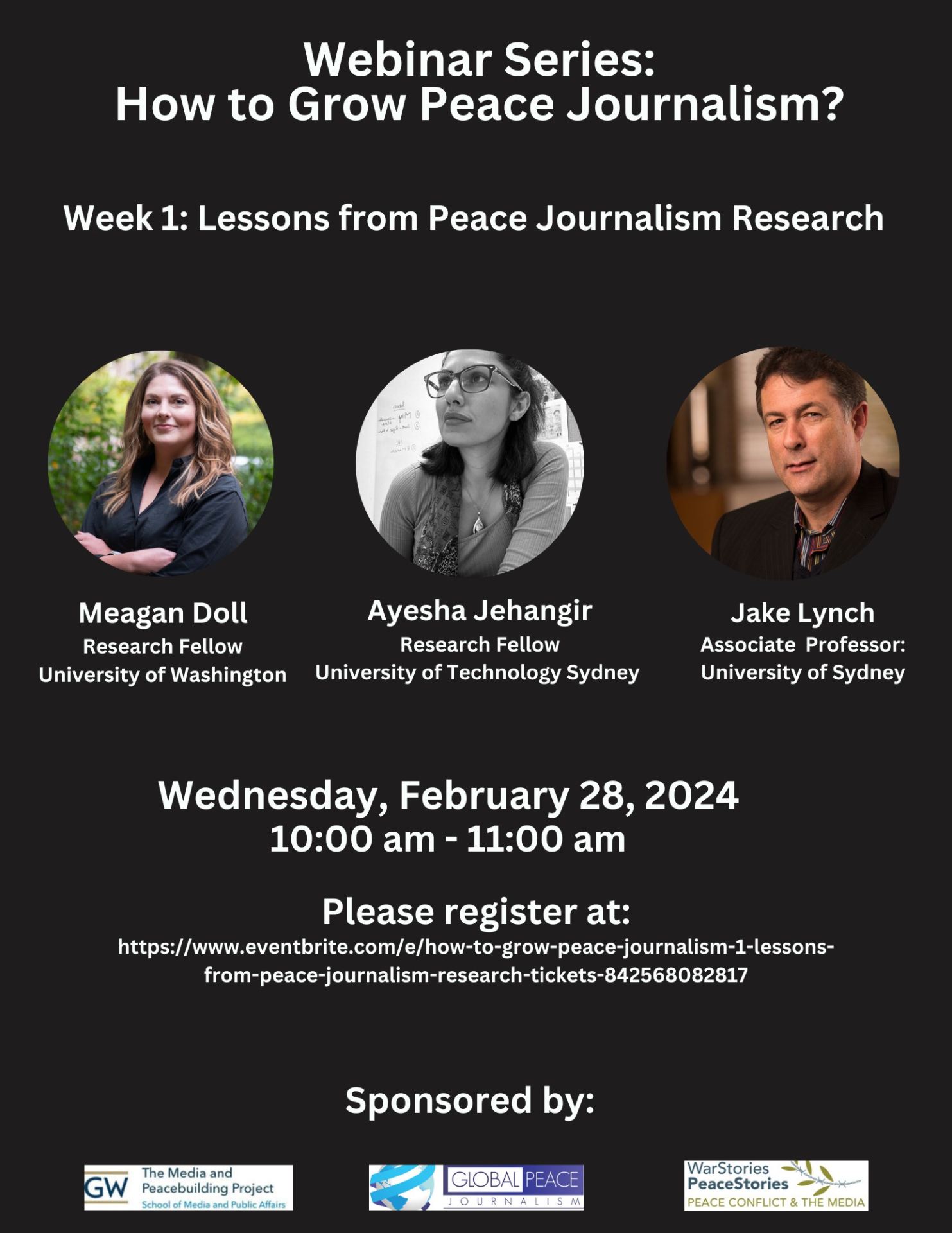
02/28/2024
Panelists
Meagan Doll is a research fellow in the Center for Journalism, Media & Democracy at the University of Washington and a PhD candidate (ABD) in the university's Department of Communication. Read More
Ayesha Jehangir is a Post-Doctoral Research Fellow with the Centre for Media Transition at the University of Technology Sydney. Read More
Professor Lynch is an Associate Professor in the Department of Peace and Conflict Studies at the University of Sydney, Australia. Read More
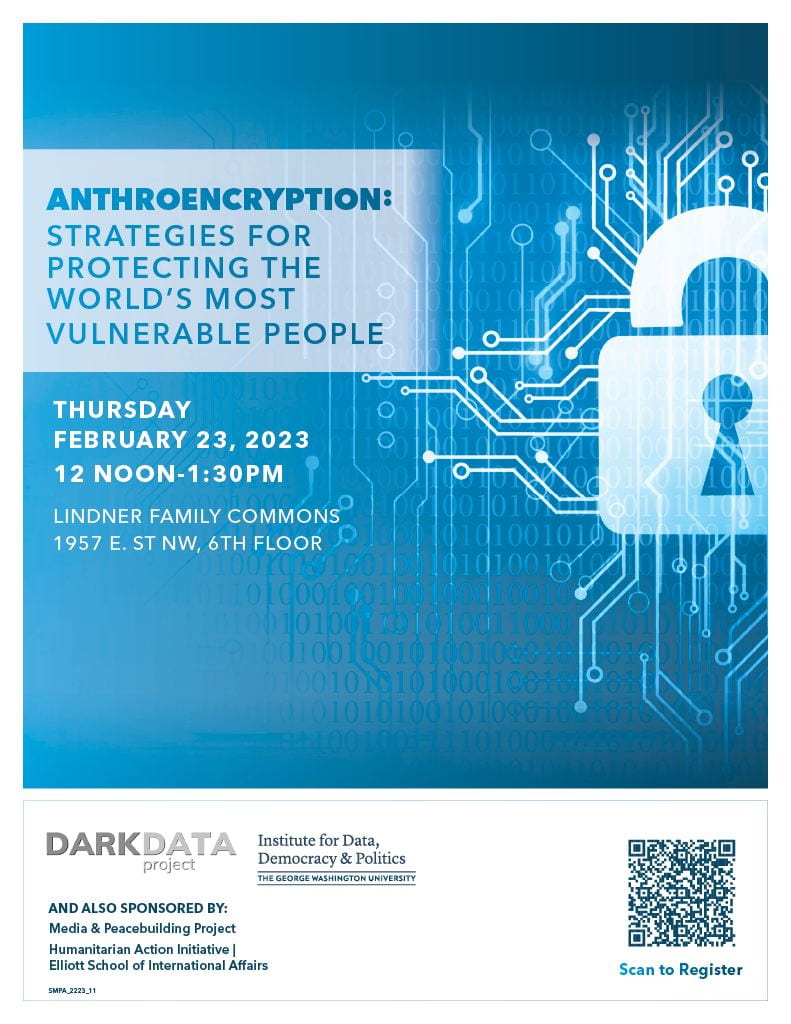
02/23/2023
Anthroencryption: Strategies for Protecting the World's Most Vulnerable People
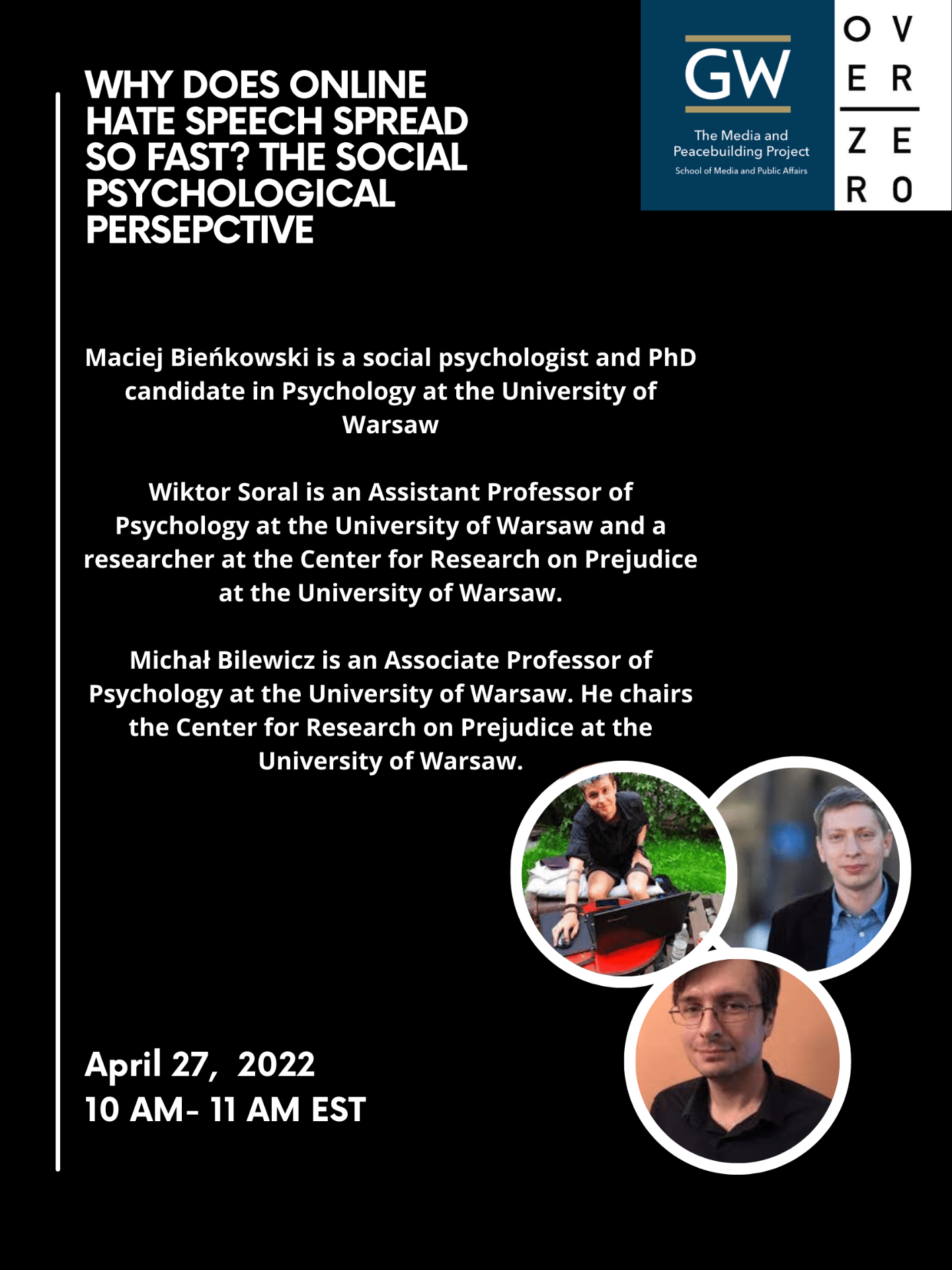
4/27/2022
Why Does Online Hate Speech Spread So Fast? The Social Psychological Persepctive
The internet and social media are often blamed for the spread of hate speech. Indeed, empirical evidence across countries supports this view. Individuals see hate speech more often online than in the traditional media, such as TV, radio, or printed newspapers. Moreover, recent evidence suggests that digital users tend to accept hate speech to a higher degree and to be more prejudiced than traditional media users. In this chapter, we present a social psychological perspective on why hate speech spreads so fast online, compared to offline channels of communication. We will explain the role of three factors: First, we propose that hate speech is frequently fueled by the emotion of contempt, which has an empathy buffering function. Second, we suggest that frequent exposure to hate speech leads to desensitization to this form of language and increased prejudice. Third, we postulate that being embedded in only a slightly hateful environment may drastically change the perception of social norms, and increase approval of hateful language. We will present a model that describes how these psychological mechanisms may act in the context of social networks, and how the very structure of the online networks - as compared to the offline networks - may amplify the significance of these psychological mechanisms. We believe that the model presented can be used to understand and possibly counteract the spread of online hate speech.
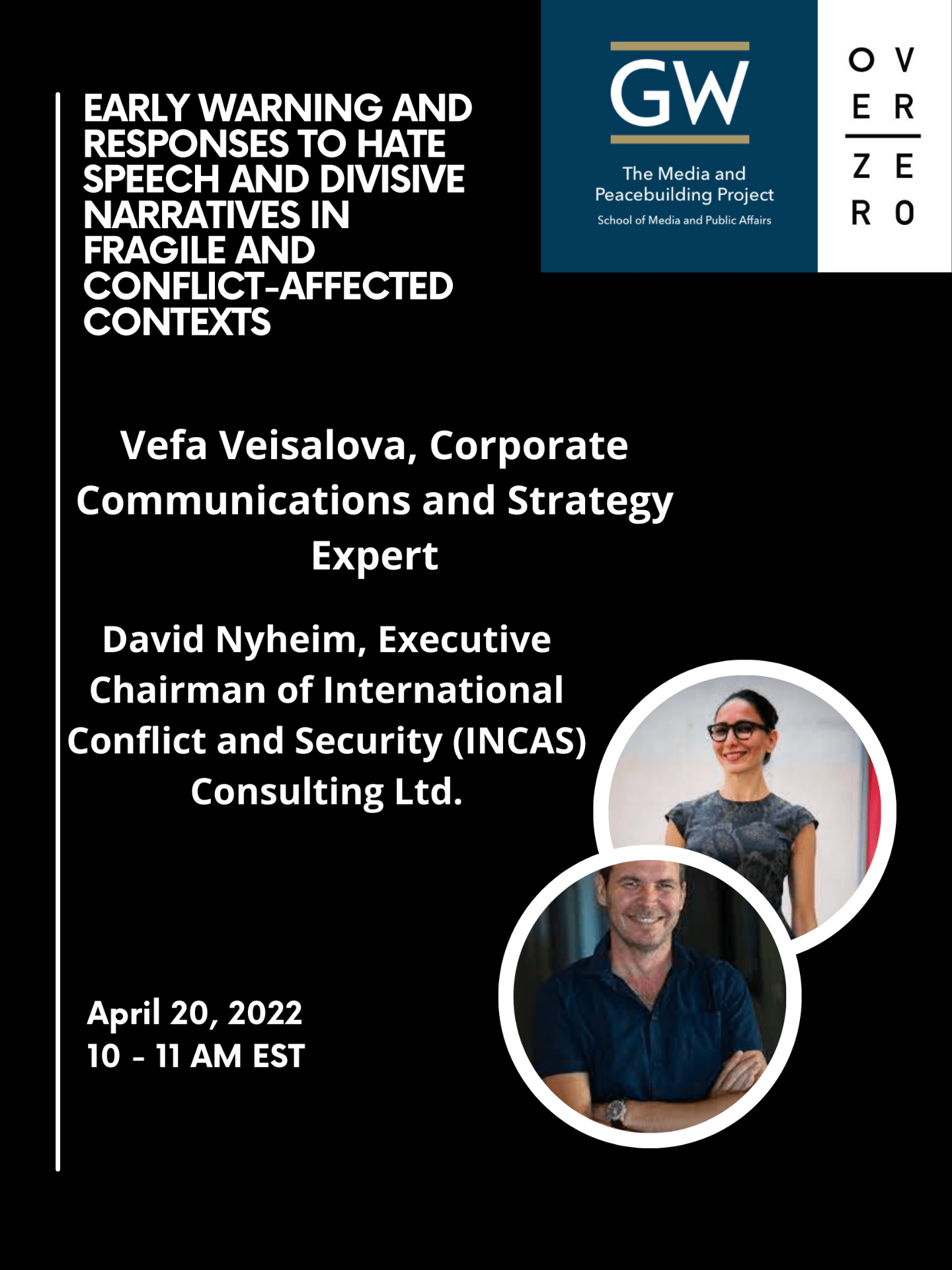
4/20/2022
Early Warning and Responses to Hate Speech and Divisive Narratives in Fragile and Conflict-Affected Contexts
This presentation looks at how hate speech has (or not) been considered as part of different types of early warning systems. It raises some of the conceptual and analytical challenges for early warning systems in relation to hate speech. Hate speech is then placed within the context of dominant and alternative narratives in fragile and conflict settings. A broader narrative framework is provided, which distinguishes between strategic, operational and tactical narratives on the one hand, and dominant and alternative narratives, on the other. Such a framework provides a useful basis for early warning systems to better integrate hate speech and divisive narratives into their analysis conflict and to identify entry-points for response.
4/13/2022
Confronting Hard Truths: Media Reform in Fragile Societies
In countries with weak institutions and numerous intersecting vulnerabilities, a free and pluralistic news media plays a central role in supporting economic and social improvements. This role is critically important in countries emerging from conflict or undergoing democratic transition, where gains made are often tenuous, and the threat of backsliding is ever-present. Ensuring that a country’s institutions, policies, norms, and values safeguard a robust and truly independent media sector is essential for combatting the divisive rhetoric, polarization, and lack of accountable governance that often prevent or stall progress in these contexts.
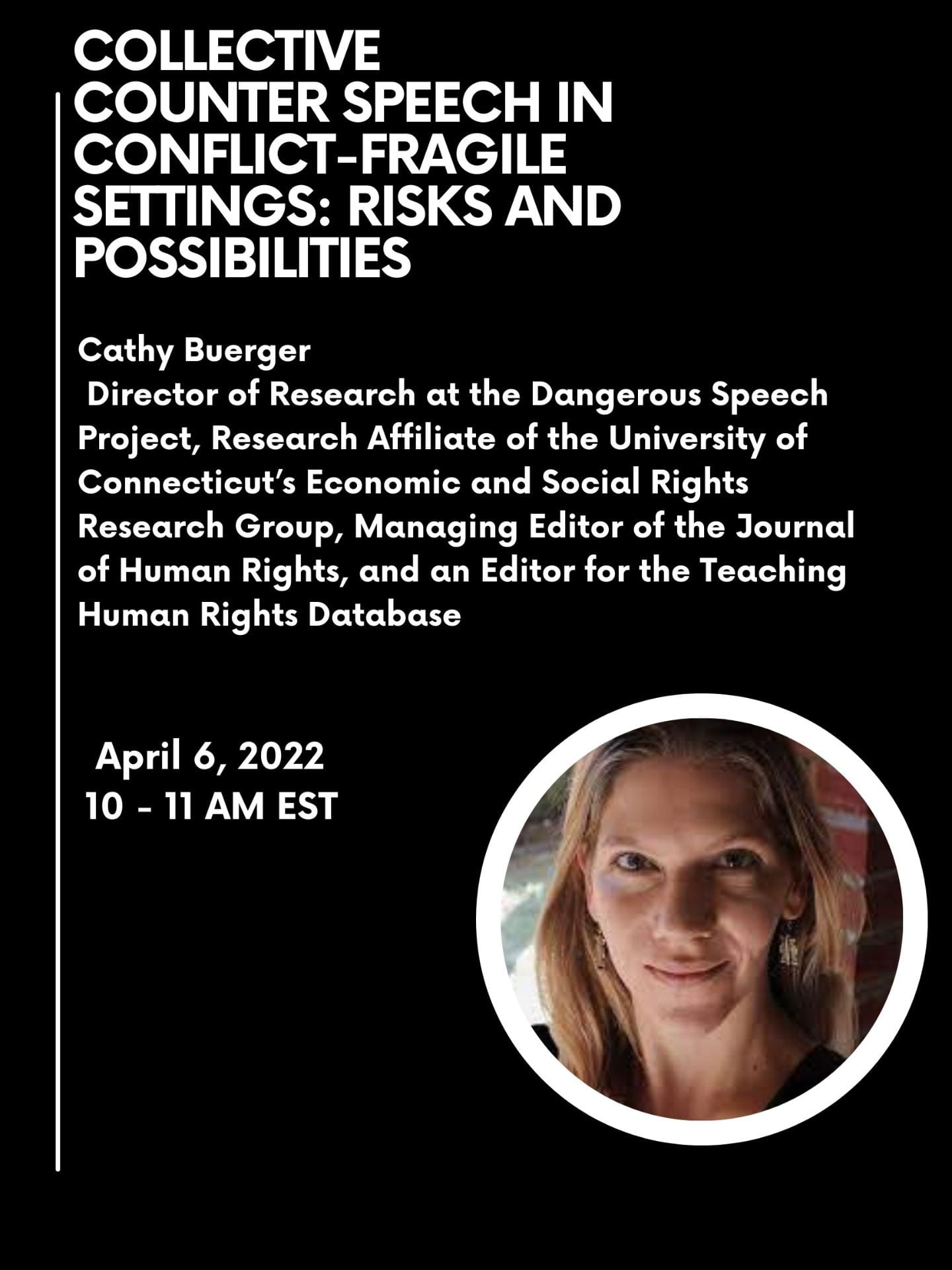
4/6/2022
Collective Counterspeech in Conflict Fragile Settings: Risks and Possibilities
Every day, internet users encounter hateful and dangerous speech online, and some of them choose to counterspeak - responding directly in order to refute or undermine the speech. Many of those who have taken on this effort go about it alone, while others organize into groups to coordinate responses and support each other. What opportunities exist for using group counterspeech to challenge dangerous and hateful speech in conflict fragile settings? What lessons can be learned from online collective action efforts already underway in countries around the world? This chapter will review the literature on collective online counterspeech, synthesizing knowledge from many contexts on the method’s effectiveness. Then, drawing on examples from Brazil, Myanmar, Nigeria, Sweden, and the United States, it will discuss the challenges and possibilities of using collective counterspeech to respond to hatred and dangerous speech in conflict fragile settings.
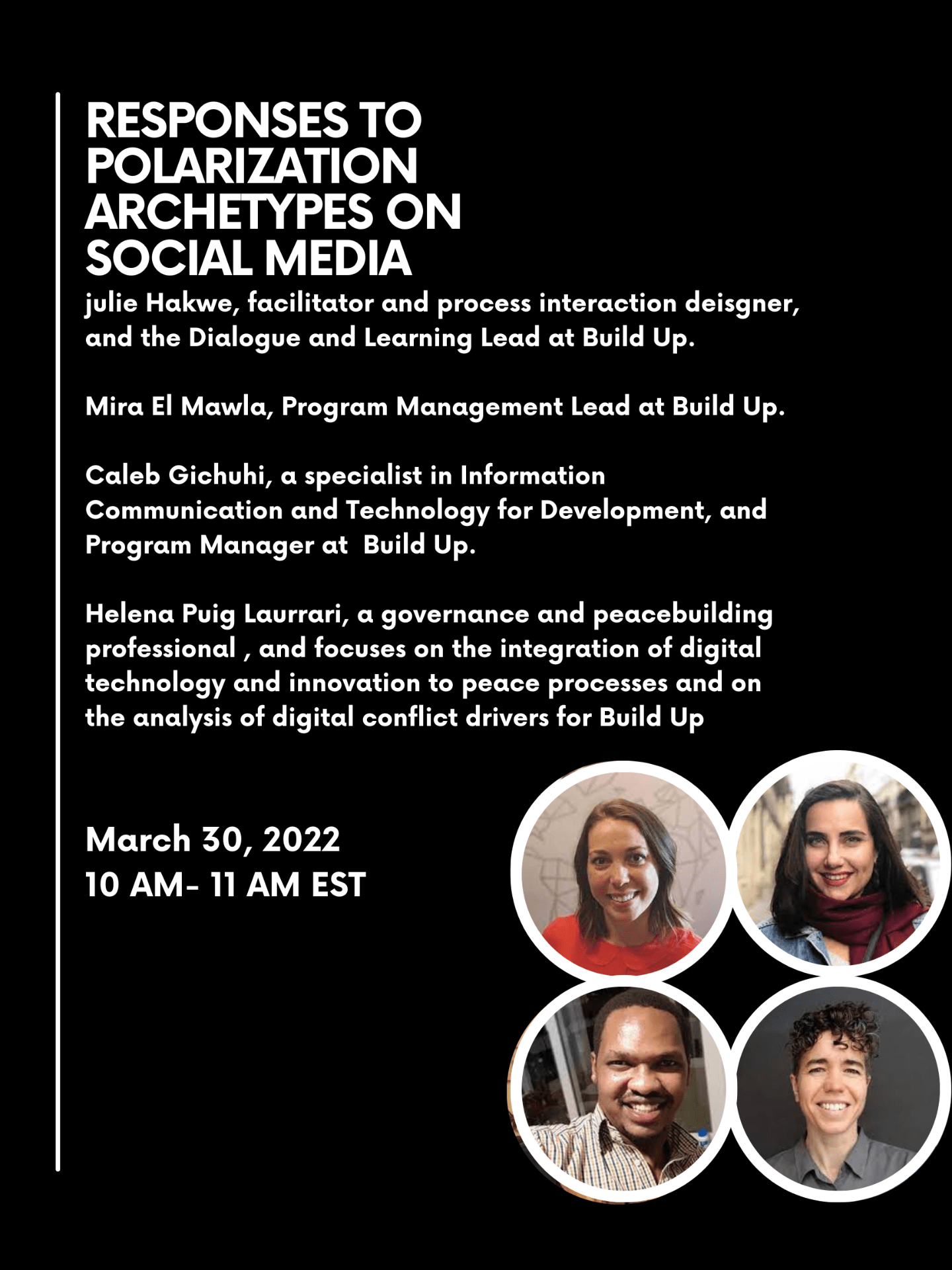
3/30/2022
Responses to Polarization Archetypes on Social Media
The presentation of online hate signals the structure and intensity of societal divisions, but when these seeds of discord are planted, what constitutes a fertile soil to grow and spread? This chapter examines the composition of online polarization as a conducive environment that can determine the scale and impact of online hate. Analyzing polarized social media environments in the US, Lebanon, and Kenya, we annotate archetypes of polarization and how they function on social media along with the strategies, entry points, and priorities these archetypes illuminate for intervention. Drawing on four years of interventions towards online de-polarization in the U.S. with the Commons Project and in Kenya with the Maskani project, we share outcomes and lessons for digital peacebuilding applicable to polarized online environments across conflict contexts.
3/23/22
Mediating online spaces: how social media affects peace processes and what can be done about it
Mediators have long talked about ‘social media as a threat to peace processes.’ But they have often done so in vague terms, viewing social media as an external threat that can be avoided or ignored. This chapter will clarify how social media threatens peace processes, and suggest a novel approach for overcoming that threat. To date, most approaches to social media and conflict have focused on minimizing the consumption of harmful information (e.g., content moderation and media literacy), or the distribution of that information (e.g., platform policies such as labelling of misinformation).
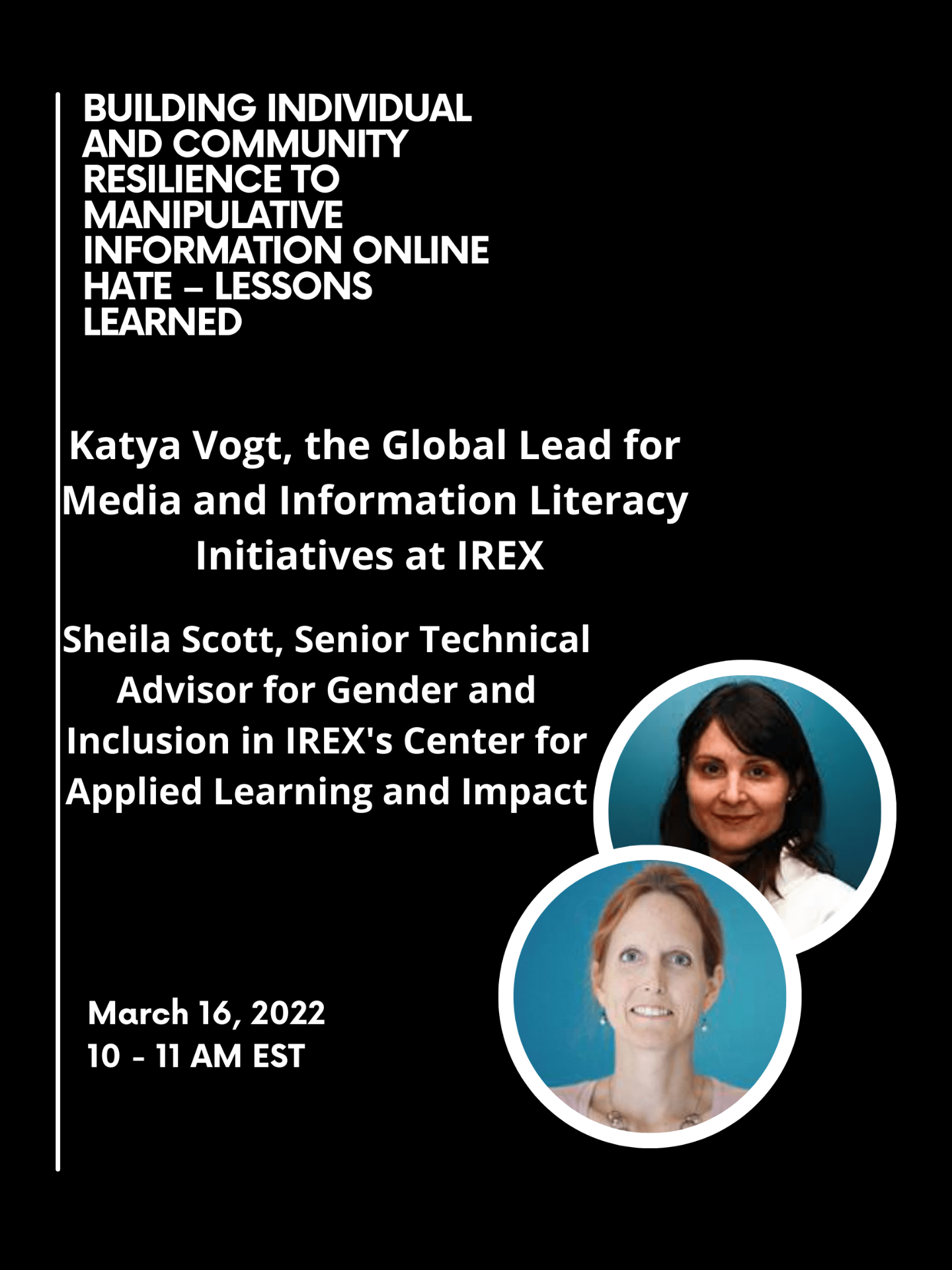
3/16/22
Building individual and community resilience to manipulative information online hate – lessons learned
Online hate speech has real life consequences and is often used as a tool of radicalization, conflict, and polarization. While hate speech has been part of propaganda for centuries, social media has given it sharper teeth by creating conditions where it truly thrives. Effective ways to address it must disrupt why and how it works. Powered by emotional engagement: “enrage to engage” is an effective formula for attracting and keeping attention. Malign disinformation actors, violent extremism organizations, conspiracy theorists, and hate groups intentionally trigger disgust, outrage, and fear to exasperate grievances, because humans are programmed to share such information widely.

3/9/2022
Why Myanmar's Facebook Users Were Susceptible to Hate Speech
Facebook’s diffusion in Myanmar has been linked to sharp increases in violence toward minority groups—especially the Rohingya. However, little is known about how people in Myanmar actually use Facebook, how they acquire, disseminate, and evaluate the information they find on the platform. We use a series of interviews conducted in Myanmar with people from many different backgrounds and ethnic groups to highlight how diverse Facebook use is in Myanmar. We show that although Facebook and the internet more broadly are western media, they do not necessarily bring an international perspective to Myanmar. In fact, we find that people utilize Facebook in a highly localized way. For example, most people almost exclusively trust and read local news on the platform, and many ethnic minorities whose alphabet is not available on Facebook find ways to circumvent this barrier and use Facebook as their “village square.”

3/2/2022
The Business Model is the Message: Reconfiguring the Enabling Environment for Hate Speech
Hate speech and incitement take advantage of the affordances of the 21st century internet, specifically those of the dominant social media platforms. The global online communications system is financially dependent on and optimized for targeted advertising. Platforms’ ad targeting algorithms and recommendation engines enable various actors to wage sophisticated influence campaigns with scarce oversight or accountability, with some of the most virulent campaigns deploying hate speech as a tactic.
The tech industry’s response centers on improving content moderation. With each new scandal, company representatives follow a predictable script: pro forma apologies, revisions of platform rules to narrowly prohibit the content or behavior in question, promises of renewed investment in algorithmic detection of prohibited content and behavior, and further expansion of human content moderation. But internal whistleblowers have revealed that companies prioritize harms or potential harms affecting large, rich, powerful countries at the expense of smaller, poorer, less powerful nations and their people, including many conflict-fragile societies, leaving them fully vulnerable to the harms that content moderation processes are intended to mitigate, like hate speech and incitement.
The interventions described elsewhere in this book, while essential, target the symptoms rather than the underlying disease: a global sociotechnical system of data exploitation and influence peddling that Shoshana Zuboff (2019) and others call “surveillance capitalism.” This chapter makes the case for restructuring the global internet economy by strictly regulating the collection and use of data, improving corporate governance, and requiring greater transparency about the processes and outcomes of content curation and moderation.
2/9/2022
Re-defining Online Hate Speech:
Frameworks and Realities in Rapidly Evolving Political Contexts
Building on the dramatic political transformations that occurred in Ethiopia since 2015, this chapter examines the potentials and limits of strategies to recognize and analyse hate speech in polarized societies. It reflects on how analytical frameworks devised to address a political context characterized by a tight control of a specific group over others may need to be radically rethought when such a group loses its grip on power, unleashing deep-rooted sentiments of resentment and retribution. This experience is used as a starting point to consider the importance of paying close attention to shifting power dynamics in conflict scenarios and devise appropriate measures to both recognize hate speech and its potential to lead to widespread violence.
1/12/2022
Tackling Online Hate Speech Through Content Moderation
Hate speech is not a new phenomenon, but it has had unprecedented consequences in the age of social media. From developed countries to war-torn regions, online hate speech has led to violence and discrimination against individuals and groups on the basis of their identity. Yet international legal rules on the matter are general and scarce. In particular, while Article 19 of the International Covenant on Civil and Political Rights (ICCPR) protects freedom of expression, it provides that speech may be limited to protect the ‘rights or reputations of others’ as well as ‘national security’, ‘public order,’ or ‘public health or morals’.
12/1/2021
Fighting Digital Hate Against Journalists: Lessons for Countering Hate Speech
Digital hate is a pervasive feature of the digital society. While we have a growing literature on the forms and the drivers of digital hate, we still have limited analysis on effective tactics to reduce and curb hateful content. This chapter aims to contribute to this topic by reviewing actions to address online hate targeted at journalists around the world. Journalists, particularly women and journalists of color, have been frequently targeted by digital hate given the nature of their work, as well as their public profile. As societies understand better the risks of journalists in the digital society, several proposals have been made for journalists’ associations, technology companies, and the news industry to strengthen the safety and the wellbeing of journalists.
11/17/2021
Weapons of mass Instruction? The Potential of Edutainment and Psycho-Education
To counter impulse-driven hate behaviour, there is an ever-growing need for an easily absorbable method of education to impart not only media literacy, but also a basic Psycho-literacy for audiences to become more resilient to their own reflexes to fear and insecurity. Radio La Benevolencija HTF (RLB) runs a long term “inoculation” project that has used Entertainment - Education media interventions, connected outreach activism and accompanying action research during 17 years of continuous, ongoing broadcasts of 3 long-duration Radio Dramas in Rwanda, Burundi and the DR Congo, reaching audiences of over 20 milion people.
4/29/21 - 5/10/21
Countering online hate and its offline consequences in conflict-fragile settings Workshop Sessions
Featured authors from Countering online hate and its offline consequences in conflict-fragile settings will be holding four workshopping sessions spanning from April 19 - May 10 hoping to get essential feedback on their respective chapters.
4/29/21 - 5/10/21
Workshop on Hate Speech Analysis and Remedies
On Wednesday October 30th, The Media and Peacebuilding Project (MPP) at GW’s School of Media and Public Affairs (SMPA) held its third workshop of the year on hate speech analysis and remedies. The first part of the workshop featured a presentation by Althea Middleton-Detzner.
5/29/19
Workshop on Defining, Monitoring, and Countering Hate Speech
The Media and Peacebuilding Project hosted a workshop on defining, monitoring, and countering hate speech on May 29 at GW's School of Media and Public Affairs (SMPA), bringing together researchers and experts to discuss a key set of questions.

